New collaboration will give first responders technology tools to save lives
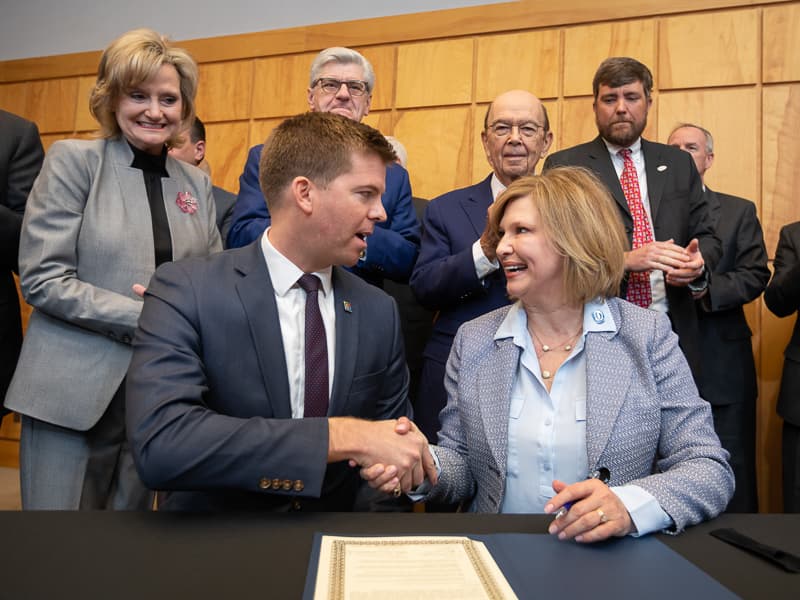
A volunteer firefighter trained as an emergency medical technician pulls up on a gravel road in a rural Mississippi county to find an overturned truck with traumatically injured passengers.
He grabs his cell to call for help, but has no signal. His training might not stretch far enough to give a child with severe head injuries the best treatment in the moment. But, if he had mobile broadband service not just to use his phone, but to livestream video on a tablet, allowing a doctor to actually look at the injured child, it could be a game-changer – and a life-saver.
It’s just one scenario that illustrates Mississippi’s need for a better broadband network that equips first responders with life-saving communication technology. “We’re thinking about ways that broadband can bring this home – video, audio, a tele-link,” said Dr. Damon Darsey, medical director of the University of Mississippi Medical Center’s Mississippi Center for Emergency Services.
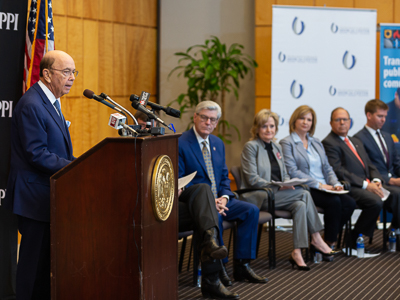
The technology boost will come through a collaboration between UMMC and the federal First Responder Network Authority, or FirstNet. On Wednesday, FirstNet executives and UMMC officials signed a memorandum of understanding to work together to improve emergency medical response and mobile broadband for rural first responders in Mississippi and nationwide.
The FirstNet Authority and the Mississippi Center for Emergency Services, or MCES, together will drive innovation to effect change, as well as share case studies, lessons learned and best practices related to public safety’s use of mobile broadband in rural areas.
In short, FirstNet will help build the technology infrastructure to allow first responders to be connected, no matter where an emergency takes them. The ability to communicate from the scene with medical personnel and other first responders gives those “first hands” the help they need to start the best treatment right then, rather than it waiting for the injured person to be flown or driven to the nearest hospital equipped to take care of them.
“We established the Mississippi Center for Emergency Services in part to help improve the knowledge and capabilities of first responders statewide, especially those serving the most remote areas,” said Dr. LouAnn Woodward, UMMC vice chancellor for health affairs and dean of the School of Medicine. She signed the memorandum with Ed Parkinson, FirstNet’s acting chief executive officer, during a ceremony on the UMMC campus.
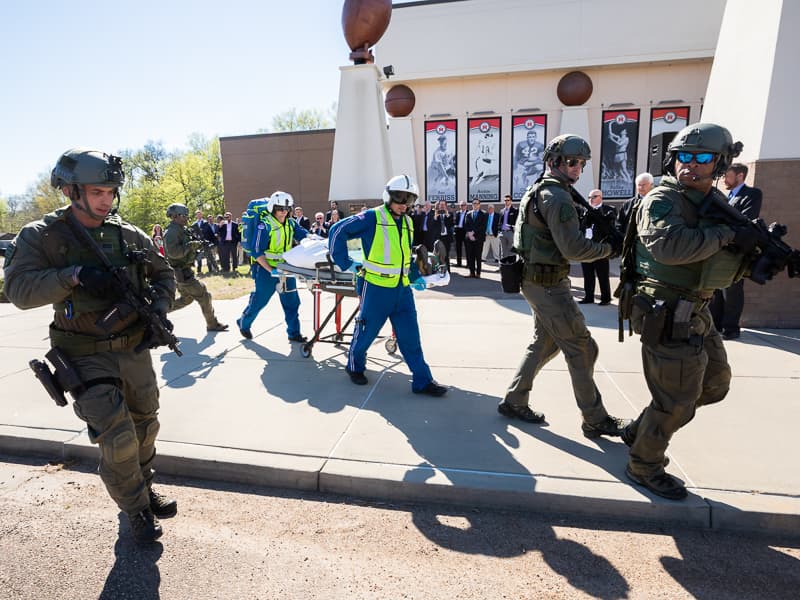
“We can handle the medical support training and emergency response communications, but we need partners to help us with the technology necessary for every part of the state to be connected to potential life-saving support in real time.”
Hyde-Smith noted that Mississippi is an agricultural state, and that “farming is a dangerous occupation.
“When we have to dial those three numbers, 911, that’s when it gets real. That’s when it matters,” said Hyde-Smith, the state’s former Commissioner of Agriculture and Commerce.
The collaboration is the first of its kind in the nation, and the hope is that it will serve as a national model for bringing technology to first responders in the field. It “will have a specific focus on rural applications of the broadband model,” said U.S. Department of Commerce Secretary Wilbur Ross, who also was on hand for the memorandum’s signing.
“Lives and livelihoods are at risk” when first responders can’t communicate with each other and with hospitals that will treat the injured, Ross said.
FirstNet is an independent authority within the Commerce Department. Chartered in 2012, its mission is to ensure the building, deployment and operation of the nationwide broadband network that equips first responders to save lives and protect U.S. communities.
UMMC, Mississippi’s only academic health sciences center, established MCES using lessons learned in the wake of Hurricane Katrina. Emergency responders realized after the storm that they had no network to communicate with each other amidst widespread devastation.
Supporting the mission is UMMC’s extensive telehealth network, which in 2017 was designated one of two Telehealth Centers of Excellence by the U.S. Health Resources and Services Administration.
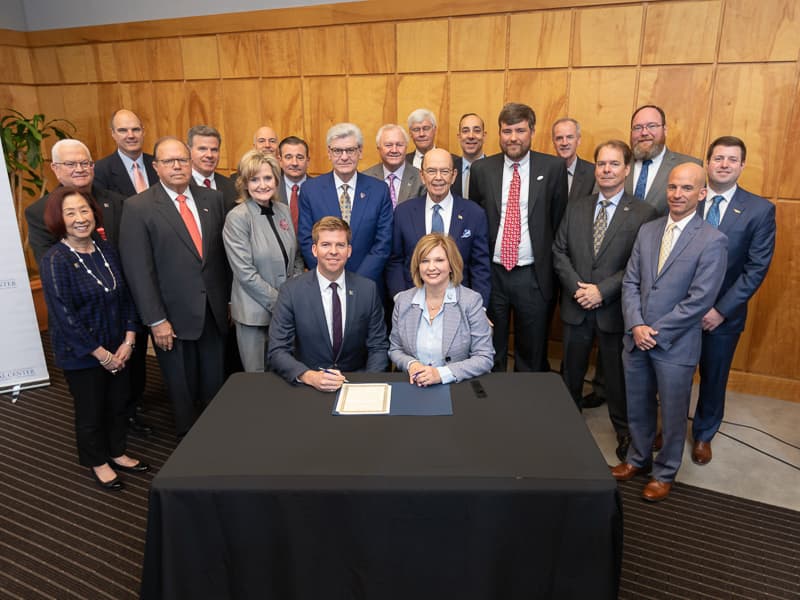
Technology “is the key addition we need to improve emergency care in rural America,” said Darsey, an associate professor of emergency medicine and former first responder with AirCare, UMMC’s medical helicopter transport.
Through the collaboration with UMMC, FirstNet will “help public safety operationalize technology for rural emergency response as the network evolves,” said FirstNet Board Chair Edward Horowitz.
First responder training offered by MCES will be incorporated into FirstNet’s new Experience Program, which aims to introduce first responders to current and future technologies through hands-on educational and learning experiences. “Building an Experience Center in Mississippi that places focus on applying broadband data to medical care will shape future innovations for public safety communications in our state,” said Marshall Burgess, technical manager for Mississippi Med-Com at UMMC, the state’s communication and patient movement coordinator center in times of disaster.
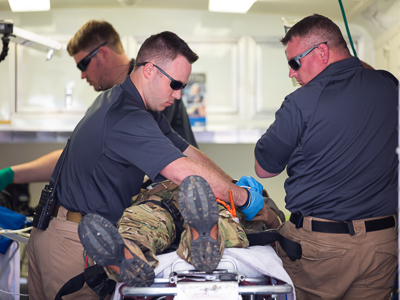
From left, Will Appleby, Chris Pearson and Ron Hopson work on the patient before being transported by UMMC’s AirCare as part of a hostage scenario demonstration held Tuesday.
An example to show Mississippi’s use of technology played out Tuesday afternoon during a hostage scenario demonstration staged by MCES at the Mississippi Agriculture and Forestry Museum in Jackson. FirstNet board members and UMMC officials looked on as Darsey and center staff showed firsthand the potential challenges emergency response workers have because of mobile broadband limitations.
During the exercise, SWAT team members from the Mississippi Highway Patrol simulated the rescue of a child being held hostage by his father. SWAT team members shot the father during the rescue; the man was taken to the hospital by UMMC’s AirCare medical helicopter transport, which landed at the museum.
“It’s important to know when you don’t have the technology. When it fails, what do you do?” Darsey told them.
“Health care professionals and our state’s first responders have an incredible array of tools, skills and databases at their disposal, but currently many of these resources exist in independent silos,” said Stephen Houck, an AirCare critical care paramedic and registered nurse who serves as manager of Mississippi Med-Com.
“FirstNet will connect these resources in a functional way that allows first responders and medical professionals to provide accurate, efficient and time sensitive care that has never been done before.”


